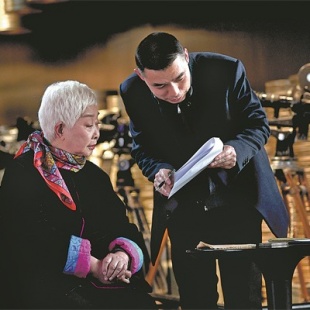A star shines her light on Chinese film


She reels off each farewell gift she got from Mei's family.
Mei Baojiu, Mei Lanfang's youngest son who was 13 back then, gave her a red envelope containing five US dollars which was the "lucky money" he got from elders as a Spring Festival gift.
"He saved the dollars for a long time and unexpectedly gave them all to me," Lu says with tears trickling down her cheeks as she looks back with nostalgia to the brotherly act of affection.
In the documentary, she also shares heartwarming memories, for instance, of her friendship with the legendary late Hollywood actress, Audrey Hepburn.
She met Hepburn in the early 1960s when the latter was filming Breakfast at Tiffany's in Los Angeles.
The two actresses, though from different cultural backgrounds, soon hit it off and became friends and confidantes.
Hepburn showed a keen interest in the qipao, the traditional one-piece, body-hugging Chinese dress that Lu often wore on movie sets. Lu gave her a piece of silk brocade embroidered with exquisite flowers to make a well-tailored qipao-like evening dress.
In return, Hepburn sent Lu a delicately designed powder box engraved with the words "Lisa with Love, from Audrey", which Lu carefully kept for half a century before she donated it to her alma mater, Shanghai Jiao Tong University, in 2014.
In the documentary, Lu also recalls other film legends, namely, Lai Manwai who is widely hailed as "the father of Hong Kong film", filmmaker Cai Chu-sheng, Chinese American actress Anna May Wong and kung fu star Bruce Lee. She reveals how they contributed to the development of the world's film industry and promoted the spirit of Chinese people.
"I'm honored that I once walked alongside them in pursuit of our film dreams, and that I'm still on the path," Lu says.
Coincidentally, all five of those trailblazers are of Guangdong origin.
Shi Chuan, an expert on China's film history, says that, due to geographical and historical reasons, many pioneers in Chinese film production were from Guangdong province, which once served as the bridgehead for China's increasing exchanges with Western countries and was a center for advanced culture.





































